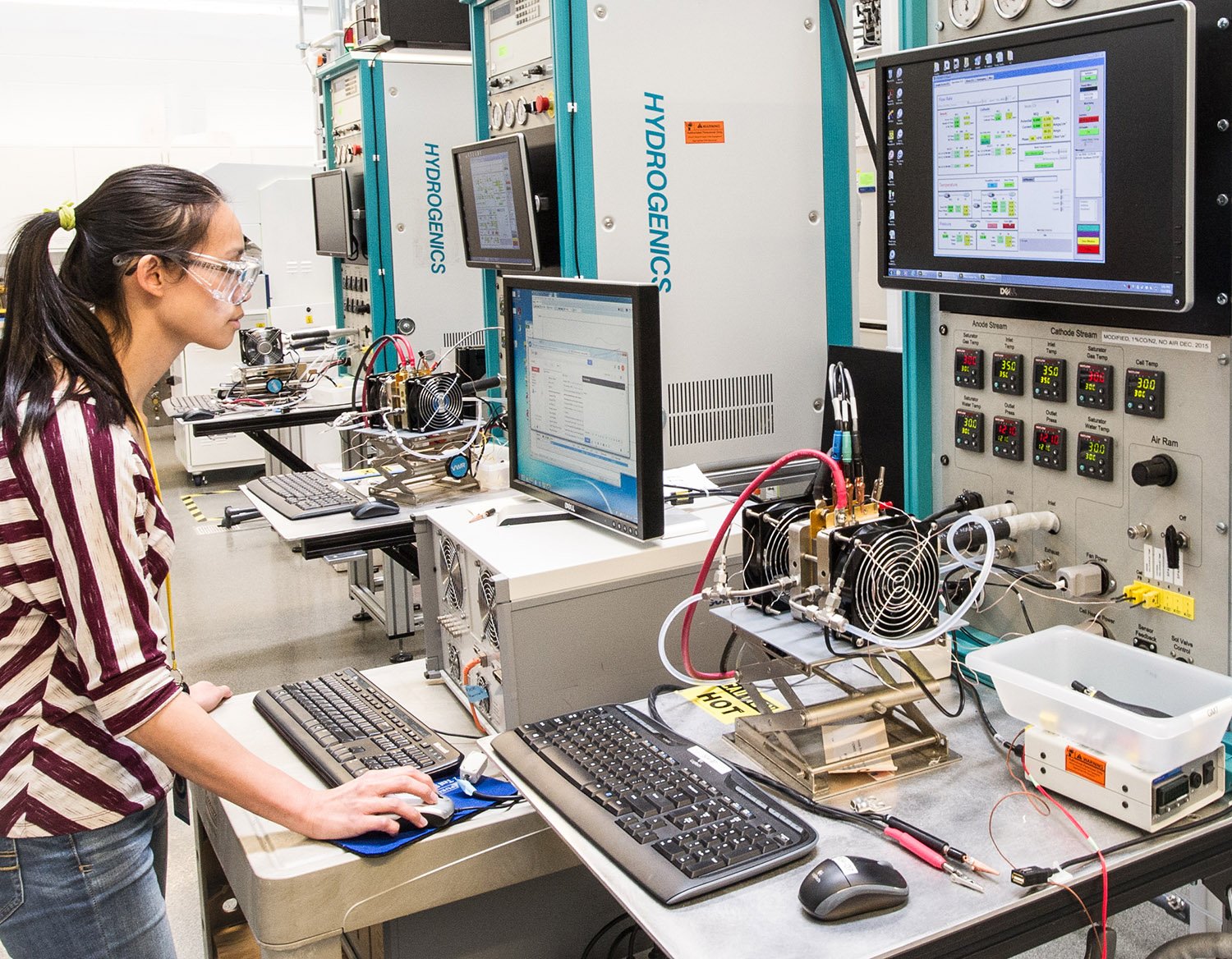Fuel Cells
NLR's fuel cell research aims to lower the cost and improve the performance and durability of fuel cell technologies for long-life, high-use applications.

What is a fuel cell?
A single fuel cell consists of an electrolyte sandwiched between two electrodes. Bipolar plates on either side of the cell help distribute gases and serve as current collectors.
Depending on the application, a fuel cell stack may contain a few to hundreds of individual fuel cells layered together. This "scalability" makes fuel cells ideal for a wide variety of applications, such as stationary power stations, portable devices, and transportation.
Research is performed on a variety of fuel cell types—proton exchange membrane, alkaline membrane, and direct methanol fuel cells—which are generally differentiated by the fuel used.
As one of five core laboratories in the Million Mile Fuel Cell Truck Consortium, NLR is advancing the durability and efficiency of proton exchange membrane fuel cells for heavy-duty trucks. NLR also participates as one of four laboratories in the ElectroCat Consortium, part of DOE's Energy Materials Network.
Catalysts
NLR's work in this area involves developing and optimizing advanced electrocatalysts and novel synthesis methods. Related projects concentrate on extended-surface catalysts with reduced precious-metal loading and improved performance, durability, and activity compared to standard catalytic materials. Researchers are investigating fuel cells and electrolyzer catalysts under acidic and alkaline conditions, with the goal of "thrifting" platinum, iridium, and their alloys (in acidic-based systems) and silver, cobalt, nickel, and their oxides/alloys (in alkaline-based systems).
Also under study are support materials for catalyst dispersion, with a focus on nitrogen-doped carbon supports and corrosion-resistant, non-carbon supports.
Polymer Electrolytes
Alkaline membrane fuel cells enable the use of non-precious-metal catalysts, but they are vulnerable to ambient carbon dioxide conditions. This vulnerability decreases, however, at higher operating temperatures. NLR researchers are developing novel chemistries to enable higher-temperature and higher-current-density operation via the use of perfluorinated alkaline membranes.
Researchers are also exploring traditional proton exchange membranes with tethered heteropolyacid functionality to allow higher-temperature, lower-humidity operation and are investigating the stability of covalently tetherable cations.
Electrode Design/High-Current-Density Operation
This cross-cutting research area focuses on incorporating novel catalysts into high-performance devices and investigating the impact of low-precious-metal loading on high-current-density performance.
Contaminants
NLR scientists are studying the effects of system-derived contaminants and hydrogen fuel quality on fuel cell performance and durability. Learn more about NLR's contaminants research and interactive material screening data tool, which helps fuel cell developers and material suppliers explore the results of fuel cell system contaminants studies.
View publications related to contaminants.
Recent Journal Publications
Adsorption Site Screening on a PGM-Free Electrocatalyst: Insights from Grand Canonical Density Functional Theory, Journal of Physical Chemistry C (2023)
Baselining Activity and Stability of ORR Catalysts and Electrodes for Proton Exchange Membrane Fuel Cells for Heavy-Duty Applications, Journal of the Electrochemical Society (2023)
Electrochemical Characterization of Evolving Ionomer/Electrocatalyst Interactions Throughout Accelerated Stress Tests, Journal of Power Sources (2023)
Elucidating the Impact of the Ionomer Equivalent Weight on a Platinum Group Metal-Free PEMFC Cathode via Oxygen Limiting Current, SusMat (2023)
Mitigation and Diagnosis of Pin-Hole Formation in Polymer Electrolyte Membrane Fuel Cells, Journal of Power Sources (2023)
Search NLR's publications database for more publications about fuel cell research.
Contact
Share
Last Updated Dec. 6, 2025
